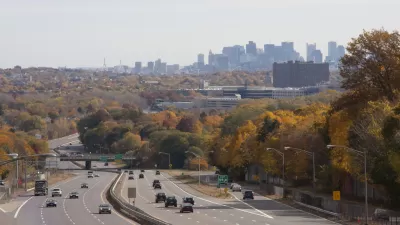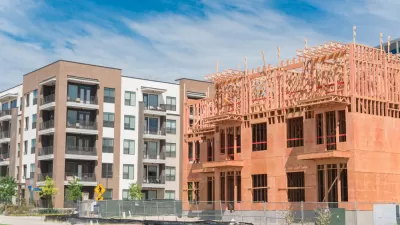The Metropolitan Area Planning Council (MAPC) is taking a strong stance in support of zoning regulations that enable new multi-family housing developments.

The Metropolitan Area Planning Council (MAPC) addresses the state of multi-family housing around the state, calling the situation a housing crisis, with an article and collection of media resources on its website.
Elise Harmon writes the article, which promotes a call to action to support zoning that allows and encourages multi-family housing development. Harmon writes in support of state bills, the Governor’s Housing Choice bill (coverage from Planetizen here) and the Great Neighborhoods bill. Taken together, argues Harmon, the bills "offer meaningful reform and help us meet today’s needs and tomorrow’s demand."
According to Harmon, the Great Neighborhoods bill outlines two possible approaches:
The first would simply direct municipalities to designate a district where multi-family construction would be allowed. This leaves the details up to the individual municipality for how to accommodate the new homes. The second approach would set a sliding scale of density targets for the multi-family zone, but allow for exemptions in places where the housing demand is not as strong.
MAPC's "Broken Zoning, Unaffordable Homes: What Can Be Done" series includes additional articles on Accessory Dwelling Units and a platform it has dubbed "Housing Choice Plus."
FULL STORY: Multi-Family Housing | Broken Zoning, Unaffordable Homes: What Can Be Done?

Planetizen Federal Action Tracker
A weekly monitor of how Trump’s orders and actions are impacting planners and planning in America.

Maui's Vacation Rental Debate Turns Ugly
Verbal attacks, misinformation campaigns and fistfights plague a high-stakes debate to convert thousands of vacation rentals into long-term housing.

Restaurant Patios Were a Pandemic Win — Why Were They so Hard to Keep?
Social distancing requirements and changes in travel patterns prompted cities to pilot new uses for street and sidewalk space. Then it got complicated.

In California Battle of Housing vs. Environment, Housing Just Won
A new state law significantly limits the power of CEQA, an environmental review law that served as a powerful tool for blocking new development.

Boulder Eliminates Parking Minimums Citywide
Officials estimate the cost of building a single underground parking space at up to $100,000.

Orange County, Florida Adopts Largest US “Sprawl Repair” Code
The ‘Orange Code’ seeks to rectify decades of sprawl-inducing, car-oriented development.
Urban Design for Planners 1: Software Tools
This six-course series explores essential urban design concepts using open source software and equips planners with the tools they need to participate fully in the urban design process.
Planning for Universal Design
Learn the tools for implementing Universal Design in planning regulations.
Heyer Gruel & Associates PA
JM Goldson LLC
Custer County Colorado
City of Camden Redevelopment Agency
City of Astoria
Transportation Research & Education Center (TREC) at Portland State University
Jefferson Parish Government
Camden Redevelopment Agency
City of Claremont





























